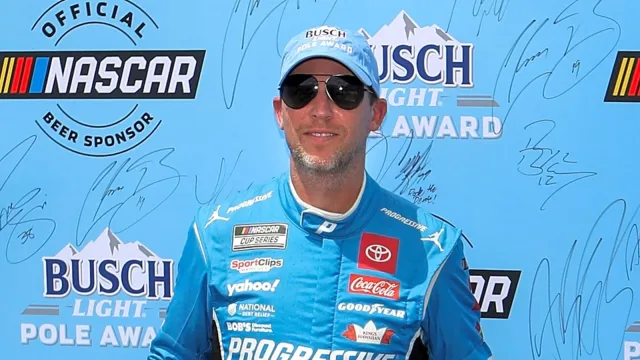Denny Hamlin criticizes NASCAR officiating after the recent Grant Park 165 at the Chicago Street Course, raising concerns about the impact of cost-cutting decisions on driver safety and race outcomes. Hamlin, speaking on his podcast, argued that delays and remote decision-making from race officials shaped the results, sparking wider debate about NASCAR’s current strategies.
Controversial Calls Change the Course of the Chicago Race
The Grant Park 165 provided clear examples of how crucial officiating is for determining race results. During the event, two major delayed decisions occurred: first involving Josh Berry, and later, Cody Ware in the final lap. These situations drew attention to the ways in which officials’ timing and judgement can affect the outcome for everyone on the track.
As Denny Hamlin discussed what happened in Chicago, he did not hold back his concerns about the consequences. He noted that the officials’ actions were outside drivers’ control, yet could significantly sway the race either way. Hamlin recounted his own observations, describing how he saw Berry’s car still stationary after an entire lap had passed, which he believed reflected the slow response from NASCAR.
Hamlin Calls Out NASCAR’s Remote Officiating and Staffing Cuts
During his podcast episode, Hamlin dissected the race with his co-host Allen, openly supporting the Chicago contest overall but also expressing deep frustration over what went wrong. Responding to Allen’s question,
“Did NASCAR wait too long to throw that caution for Josh Berry?”
, Hamlin was unequivocal:
“He was sitting there, driver’s door first, into a corner that is heavy, heavy breaking. Absolutely, that was a late call.”
—Denny Hamlin, Joe Gibbs Racing Driver
The delays led Allen to remark,
“Waiting on a caution was the story of the day when it came to making the calls.”
—Allen, Podcast Co-host
The discussion soon turned to current race monitoring procedures. Hamlin explained that the Chicago race was managed from Charlotte, North Carolina, rather than from on-site. Previously, NASCAR had stationed officials at the course who could report incidents in real time for more accurate decisions, which Hamlin saw as a vital component for safety and fairness.
Cost-Cutting Measures Raise Safety Concerns
One of Hamlin’s main criticisms was NASCAR’s reduced use of on-site personnel in favor of remote officiating—a move he attributed to cost savings. He also addressed their reliance on camera feeds alone to monitor dangerous parts of the course. As Hamlin put it,
“If you’ve got cameras on all corners, which they say they do, then you’ve got to have a person per camera. That’s their job. I’m sorry. You can’t look at multiple monitors and think that you’re catching it all. That’s not realistic.”
—Denny Hamlin, Joe Gibbs Racing Driver
Hamlin doubted NASCAR’s willingness to dedicate the funds needed for more on-ground officials at each corner of road courses. He added,
“I don’t know whether they’re willing to spend the money to do that because obviously they [NASCAR] did this to save money in the long run.”
—Denny Hamlin, Joe Gibbs Racing Driver
Broader Implications for Drivers and the Series
Beyond the immediate context of the Chicago Street Course, Hamlin cited previous events, such as last year’s Xfinity Series race at The Roval. There, Parker Kligerman lost a potential victory due to another questionable caution call, underlining a pattern Hamlin believes is becoming more common under current policies.
Hamlin’s criticisms have reignited discussions within the NASCAR community about whether cost-saving measures compromise safety and fairness for drivers like Josh Berry and Cody Ware. As the sport continues to evolve, the central issue remains how to balance operational expenses with the duty to ensure proper officiating and protect everyone competing in races.
Our Reader’s Queries
Q. How did Denny Hamlin get so rich?
A. Denny Hamlin began racing full-time in the Cup Series in 2006 with Joe Gibbs Racing. Since then, he has achieved 51 Cup Series victories. He has also won the Daytona 500 three times, in 2016, 2019, and 2020, while making millions of dollars throughout his career.
Q. Why did Denny Hamlin sue NASCAR?
A. Late last year, 23XI and Front Row filed a lawsuit against NASCAR because they did not want to sign new charter renewal agreements. They sought a temporary court order to be acknowledged as chartered teams this season. However, on Thursday, the Fourth Circuit Court of Appeals in Richmond, Virginia, decided in favor of NASCAR.
Q. How did Denny Hamlin get rich?
A. He has built a huge empire valued at $65 million through his career earnings, endorsements, and investments in real estate. Hamlin’s financial success comes from: ✔ Earning a lot from NASCAR race winnings and contracts. ✔ Securing long-term sponsorships with companies like FedEx, Jordan Brand, and Toyota.
Q. How is Denny Hamlin so rich?
A. How Hamlin Built His Wealth: ✔ He earned a lot from NASCAR races through winnings and contracts. ✔ He secured long-term sponsorships with FedEx, Jordan Brand, and Toyota. ✔ He co-owns 23XI Racing with Michael Jordan, making him a businessman beyond racing.
